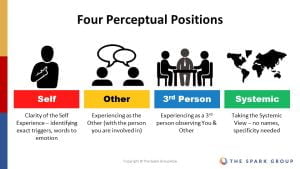
Being a leader, it requires a healthy integration of Self and Others. I didn’t use the word “balance”, because between the two, there won’t always be balance or perfection. In leadership situations, it’s about knowing when to use points-of-views of Self and Others.
In the Leadership Matrix Program, we use the Four Perceptual Positions.
In short, the Four Perceptual Positions is to help leaders integrate points of view (POVs) of Self, Other, 3rd person, and Systemic POVs.
 This helps leaders to make better decisions, rationalize, de-personalize problems that cloud judgment, and take win-win-win actions for each party involved.
This helps leaders to make better decisions, rationalize, de-personalize problems that cloud judgment, and take win-win-win actions for each party involved.
Certain situations can cause triggers in leaders, due to past experiences, and it is important to be aware of that. For instance, some leaders develop unhealthy beliefs about employees, because of a traumatic experience in the past, and quickly assume that all employees (in the future) will produce the same experience.
Take for example, a CEO of a fast-growing interior designer client that we had, experienced a group of employees who were using company resources to grow their own company. He quickly assumed that all employees were out to perform the same “trickery”, and became cautious and untrusting around future employees. While it is right to implement check-and-balances in company systems, he started to be extremely critical of employees, while being accusatory of employees’ behaviors. This kind of mindset can cause friction in the company.
Having healthy beliefs about oneself and others is crucial when in a position of leadership, especially when leading a team.
Here are some Key Beliefs that can help promote a healthy mindset:
- Self-awareness & Introspection: As a leader, it’s important to be aware of your own strengths, weaknesses, and biases. Knowing your own limitations and being able to acknowledge your mistakes can help you build trust with your team and promote a culture of openness and accountability.
- Empathy (putting yourself in others’ shoes): Leaders who are able to empathize with their team members can build stronger relationships and foster a sense of community within their organization. Empathy involves listening actively, being present, and putting yourself in another person’s shoes.
- Growth & Development Mindset: A growth mindset involves believing that you and your team can learn and grow through effort and perseverance. This belief can help you overcome obstacles, take calculated risks, and embrace feedback and criticism as opportunities for growth.
- Positive Reinforcement & Acknowledgment: As a leader, it’s important to recognize and reinforce positive behaviors in your team. This can help motivate and encourage your team members, build their self-esteem, and foster a positive work environment.
- Trust: Trust is a fundamental aspect of any healthy relationship, including the relationship between a leader and their team. Leaders who trust their team members and empower them to take ownership of their work can build a sense of autonomy, accountability, and motivation within their organization.
By cultivating these healthy beliefs, leaders can create a positive and productive work environment, build stronger relationships with their team members, and foster a culture of growth and innovation.
Learn more in The Leadership Matrix Program.



